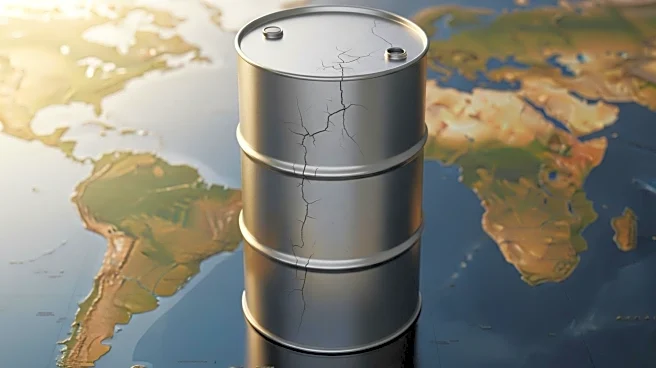What's Happening?
Oil traders anticipate that the Organization of the Petroleum Exporting Countries (OPEC) and its allies, collectively known as OPEC+, will keep crude production levels steady at their upcoming meeting. This decision follows a series of accelerated supply increases aimed at recovering market share lost to competitors. The group recently completed the revival of 2.2 million barrels per day (bpd) of halted production ahead of schedule. Despite stable demand in recent months, the International Energy Agency forecasts a significant surplus by the end of the year. Oil prices have decreased by approximately 9% this year, influenced by OPEC+'s unexpected production ramp-up, which has contributed to a surplus exacerbated by reduced Chinese fuel consumption and increased supplies from the United States, Brazil, and Canada.
Why It's Important?
The decision by OPEC+ to potentially maintain current production levels is significant for global oil markets and economic stakeholders. A stable output could help manage the anticipated surplus, which threatens to lower oil prices further. This situation poses a challenge for oil-producing nations, including those in the Persian Gulf and the U.S. shale industry, as reduced prices could impact revenue. Conversely, lower oil prices benefit consumers and industries reliant on fuel, aligning with President Trump's advocacy for reduced fuel costs. The outcome of OPEC+'s meeting will influence market dynamics, affecting both producers and consumers worldwide.
What's Next?
OPEC+ is scheduled to hold a video conference on Sunday to discuss production levels for October. While a majority of traders and analysts expect the group to maintain current output, some predict a modest increase. The decision will depend on evolving market conditions, including refinery maintenance and potential price fluctuations. Analysts, such as Martijn Rats from Morgan Stanley, suggest that OPEC+ may need to cut production next year to prevent a significant glut. The group's actions will be closely monitored by industry stakeholders and could prompt reactions from major oil-producing countries.
Beyond the Headlines
The strategic decisions by OPEC+ reflect broader geopolitical and economic considerations. The pursuit of market share recovery highlights the competitive nature of global oil markets, where production adjustments can have far-reaching implications. Additionally, the interplay between oil prices and economic policies, such as those advocated by President Trump, underscores the complex relationship between energy markets and political agendas. Long-term shifts in production strategies may influence global energy security and economic stability.









